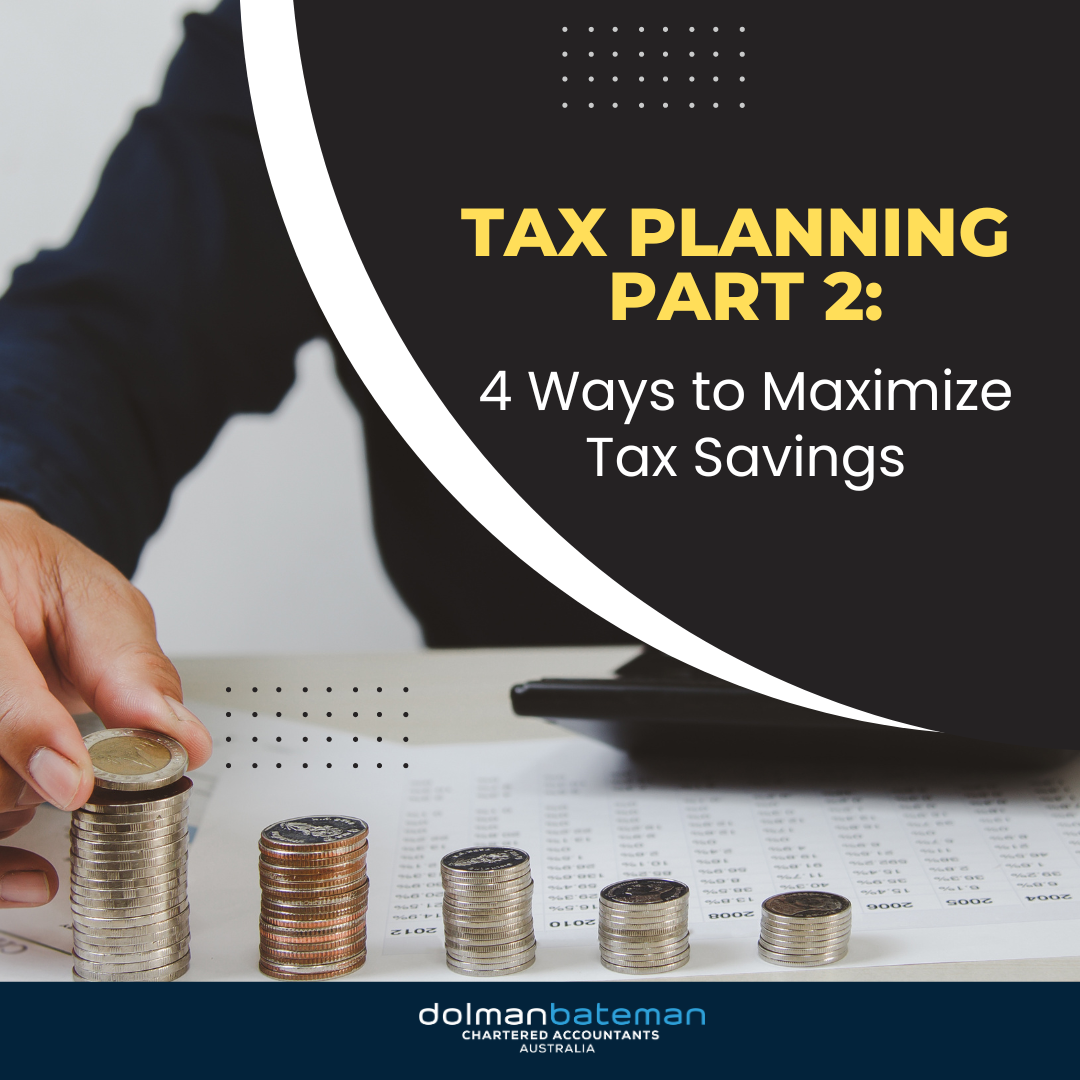Tax Planning Part 2: 4 Ways to Maximize Tax Savings
- Arnold Shields

- May 31, 2024
- 2 min read
Updated: May 13, 2025

Welcome to Part 2 of Dolman Bateman’s 2024 Tax Planning Series, where we move from theory to action.
If you want to cut your tax bill and hold on to more of your income, it's time to dig into the practical tax strategies that really work. Whether you’re a salary earner, small business owner, or investor, there’s something here for everyone.
Let’s unpack key strategies that help Australians make smarter financial decisions at tax time.
1. Capitalise on Key Deductions
Knowing what you can legally deduct is fundamental to reducing your taxable income.
Work-Related Expenses
If you incur work-related costs that aren’t reimbursed, such as:
Occupation-specific clothing or uniforms
Travel between worksites
Ongoing professional education
You may be eligible to claim them.
Home Office Costs
As remote work becomes the norm, don’t miss out on:
ATO’s fixed rate deduction (67 cents/hour)
Actual cost method (apportioned electricity, internet, and equipment depreciation)
Investment-Related Expenses
If you earn income from investments, you can usually claim:
Interest on investment loans
Fees for investment advice
Property agent management fees and repairs
2. Utilise Available Tax Credits
Tax credits directly reduce the tax you pay—not just your taxable income.
Franking Credits
If you receive dividends from Australian shares, you may be eligible to claim franking (imputation) credits. These offset tax already paid by the company.
R&D Tax Incentive
Businesses investing in innovation can access generous R&D tax offsets. This incentive is designed to fuel product development and long-term competitiveness.
3. Don’t Miss These Lesser-Known Deductions
Hidden gems in the tax system can save you thousands if you know where to look.
Education and Training
Up-skilling or maintaining your knowledge for your current job? Your training and course costs may be deductible.
Depreciation of Assets
Don’t forget to depreciate income-generating assets like:
Rental property fixtures
Business equipment
Expensive electronics used for work
Managing Your Tax Affairs
You can also deduct the cost of:
Preparing your tax return
Accounting fees
Dealing with the ATO or seeking tax advice
4. Prepay Expenses to Accelerate Deductions
If you anticipate earning more this financial year, consider prepaying expenses before 30 June to bring deductions forward. Examples include:
Investment loan interest
Business rent and utilities
Memberships and subscriptions
Keep More in Your Pocket
The ATO isn’t going to remind you about every deduction or credit you’re eligible for, but we will. Strategic tax planning isn’t about dodging tax, it’s about knowing the system and using it to your advantage.
Need expert advice tailored to your situation? Call Dolman Bateman on 02 9411 5422, let’s chat about how we can help you reduce your tax burden this year.
Stay tuned for the next instalments in our 2024 Tax Planning Series, we’re just getting started.
Disclaimer:
The information provided in this article is general in nature and does not constitute personal financial, legal or tax advice. While every effort has been made to ensure the accuracy of this content at the time of publication, tax laws and regulations may change, and individual circumstances vary. Dolman Bateman accepts no responsibility or liability for any loss or damage incurred as a result of acting on or relying upon any of the information contained herein. You should seek professional advice tailored to your specific situation before making any financial or tax decision.



